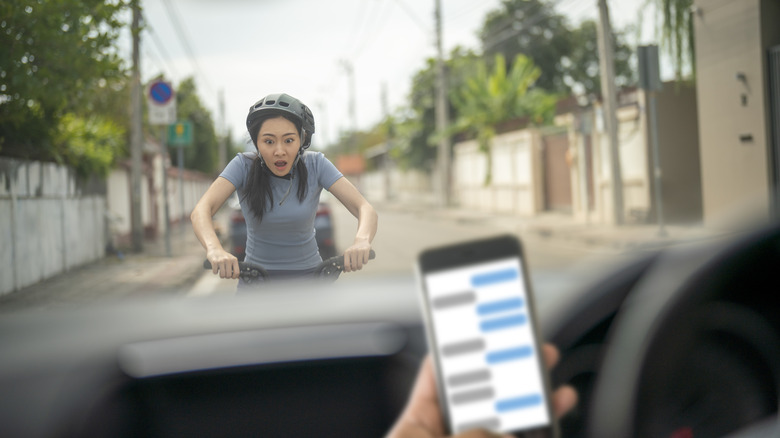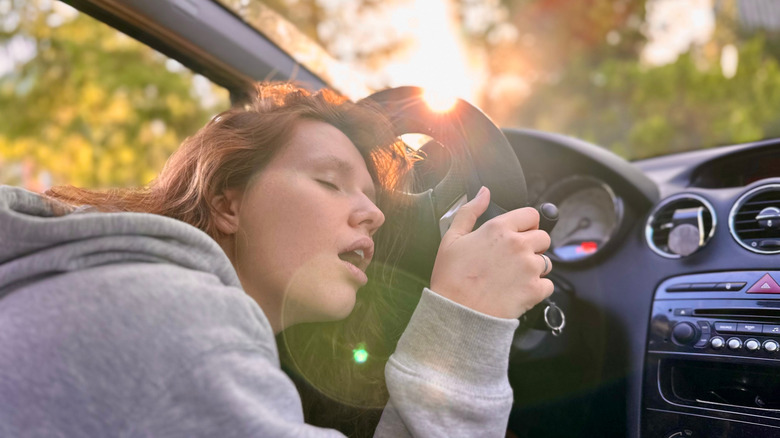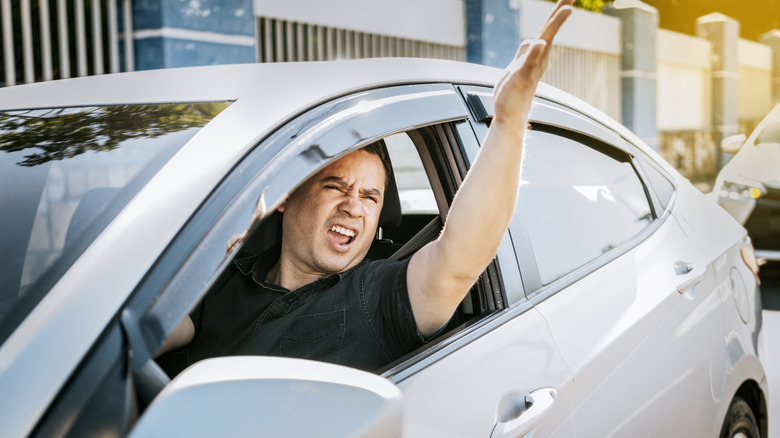Avoid These Dangerous Driving Mistakes At All Costs During Your Next Road Trip
If you're the kind of traveler who loves to discover hidden gems, take unplanned detours, and make spontaneous decisions on where to go next, then road trips are the perfect way for you to travel. Of course, the convenience and efficiency of traveling by plane can't be topped — but it doesn't allow you to stop and smell the roses (or the mouthwatering roadside BBQ joint) along the way.
You can visit some beautiful national parks without the need of a car, or jaunt between historic European cities glamorously on a luxury train ride — but some off-the-beaten path destinations require a set of wheels. There's something nostalgic about road tripping. The freedom of the open road has been immortalized in music, movies, and literature, and road trips remain one of the most iconic coming of age experiences available in our modern world. All that said, traveling by car is by far the most dangerous way to travel.
Each year over a million people die in car crashes worldwide. You shouldn't be scared of taking an epic road trip. After all, many millions of people do so without incident or injury. You should, however, make sure that you take every possible safety precaution. There are several dangerous driving mistakes that could cost you your life on a long-haul road trip.
Using your cell phone
If you drive down any major highway in the United States you'll probably encounter a sign over the road with some iteration of "DON'T TEXT AND DRIVE." Smartphones are a rather new problem when it comes to road safety. If you were born before the mid 1980s you probably remember when you had to rely on a good old fashion road atlas. These days, it's rare to see a person who has reached driving age who isn't glued to their screen.
We all know how tempting it can be to send a quick text to a friend when you're stuck in traffic and running late. An epic song that pops up on your Spotify queue may have you reaching for your phone to hit the favorite button. I'm ashamed to admit that I once found myself drawn to an Instagram notification only to realize that I had spent a few seconds scrolling through reels before remembering I was driving 55 mph down a country road. It may seem like glancing at your phone for a moment is a harmless mistake — but it could cost you your life. It only takes a split second, and each year, distracted driving is responsible for thousands of auto-related deaths.
Cell phones are only one type of distracted driving. You could also get into trouble trying to eat that aforementioned mouthwatering roadside BBQ behind the wheel. Applying makeup, talking to other passengers, searching for a lost item, daydreaming, or getting so into your road trip playlist that you're singing along at the top of your lungs with your eyes closed are all examples of distracted driving. Anything that takes your eyes, ears, or attention away from the road is problematic. If you're the one behind the wheel it's crucial that you focus on the task at hand — getting yourself and your passengers safely to your destination.
Driving under the influence
Imagine you're on a road trip in Northern California. You decide to stop at one of the beautiful vineyards to enjoy a wine tasting. You enjoy a few different wines and spend some time wandering around the vineyards. When it's time to leave and head to your Airbnb for the night you think you feel sober enough to get behind the wheel. It may not seem like a big deal, but even consuming a single glass of wine has the potential to impair your ability to drive safely.
It should go without saying that driving drunk is an absolute no-no. Thousands of fatal car crashes are caused by drunk drivers in the United States each year. Most of us know better than to get behind the wheel when we're intoxicated, but some people push the limits. Even if you don't cause an accident, it's super illegal and you could lose your license. You're able to get a DUI even after one drink. It can be fun to consume alcohol on vacation, but you should always make sure there is a designated driver. Don't start drinking until you are done driving for the day.
Alcohol isn't the only thing that can impair your ability to drive. Many states in the U.S. and other countries around the world have legalized recreational marijuana. While marijuana is often considered a safe alternative to alcohol, it is unsafe to drive if you are high. Save the gummies for when you reach your destination. Obviously, the same goes for illegal drugs. Even certain medications can make driving unsafe. As a rule of thumb, if "drowsiness" is listed among the side effects you should not take it while driving without permission from your doctor.
Driving when you should be sleeping
Spending long hours behind the wheel can be monotonous and exhausting. If you're trying to reach your destination quickly, it can be tempting to push through your tiredness and keep driving. You may think you can stay awake by rolling the windows down or blasting your music, even when your co-pilot (or passenger princess) is snoring in the seat next to you. Trying to fight fatigue behind the wheel is not safe. Each year hundreds of drivers fall asleep behind the wheel and many of them end up injured or dead. It simply isn't worth risking lives to clock a few extra miles on the road. According to the National Highway Traffic Safety Administration (NHTSA) there were 633 deaths related to "drowsy-driving" in the United States in 2023 alone.
You need to get a solid night's rest each night when you're road tripping. Adults should aim for a minimum of seven hours and teenagers need at least eight hours.Sleep deprivation is cumulative so if you're sleeping for a short amount of times a few nights in a row, fatigue can come on faster. Most accidents related to driving fatigue occur between midnight and 6 a.m., or in the late afternoon. Don't drive after midnight if possible, and avoid driving more than 10 hours a day. Coffee can help temporarily, but sleep in your car if you need to.
Do yourself and everyone else on the road a favor and find a place to stop and rest when you start feeling tired. Rest stops are a great alternative but certain businesses also offer free overnight parking for your RV or car. You can also rent an inexpensive motel room or a campsite if you'd prefer to have access to bathrooms and showers.
Aggressive driving behavior
Driving aggressively is a major cause of traffic accidents worldwide. Aggressive driving is essentially a blanket term that encompasses all sorts of unsafe driving behavior. Perhaps you're excited to get to your destination and so you decide it's not a major problem to go 10-15 mph over the speed limit. Think again. Speeding is the cause of about a third of all deadly car crashes. In 2023 nearly 12,000 people were killed as a result of speeding. When you speed, you increase your chances of losing control of your vehicle. It's also more difficult to react in time if you encounter a hazard on the road. Car crashes are almost always more severe if they happen when you're speeding.
Aggressive driving can also mean letting your anger get the best of you while you're behind the wheel. At some point, we've all encountered frustrating situations while driving. Perhaps someone cut you off or flipped you the bird when you made a wrong turn. Sure, it's annoying, but getting angry doesn't do you any favors and can lead to serious consequences.
More common forms of aggressive driving include tailgating other vehicles, failing to use your turn signal, not allowing other vehicles to merge safely, and failing to yield. If you're driving in inclement weather and you refuse to slow down, or become overly confident in your vehicle's all-wheel-drive capabilities, that can also be a form of aggressive driving.
Not wearing your seatbelt and other safety mistakes
Hopefully your road trip passes by without any issues, but if you are involved in a traffic accident it's crucial that you're wearing your seatbelt. Seatbelts may feel a little uncomfortable after you've been in the car for hours, but they are life saving devices and you should never be in a moving vehicle without wearing one. According to the NHTSA, seatbelts saved nearly 15,000 lives in 2017 alone. Another chilling statistic states that 49% of the people who died in car accidents that year were not wearing their seatbelts. Experts at the NHTSA believe that many of those deaths could have been prevented with proper seatbelt usage.
You should also avoid hanging your limbs outside of the window or resting your feet on the dashboard. It's understandable that you may want to stretch out while on a long road trip, but your comfort shouldn't cost you your safety. If you sit with your feet up on the dashboard, you could get seriously injured in a collision. The airbags could dislocate or fracture your legs or hips. It also makes your seatbelt less effective. You could slide down underneath the lap strap which could cause damage to your internal organs — the kind of injuries that could lead to paralysis or death.
The freedom of the open road is inspiring, but as good as it might feel to have the wind in your hair — you should keep your head (and limbs) inside the vehicle at all times. Sadly, there have been several tragic cases in which children have been killed from sticking their heads out of moving vehicles. Hanging an arm or a leg out of the car window could also cause serious injuries during a car crash.





